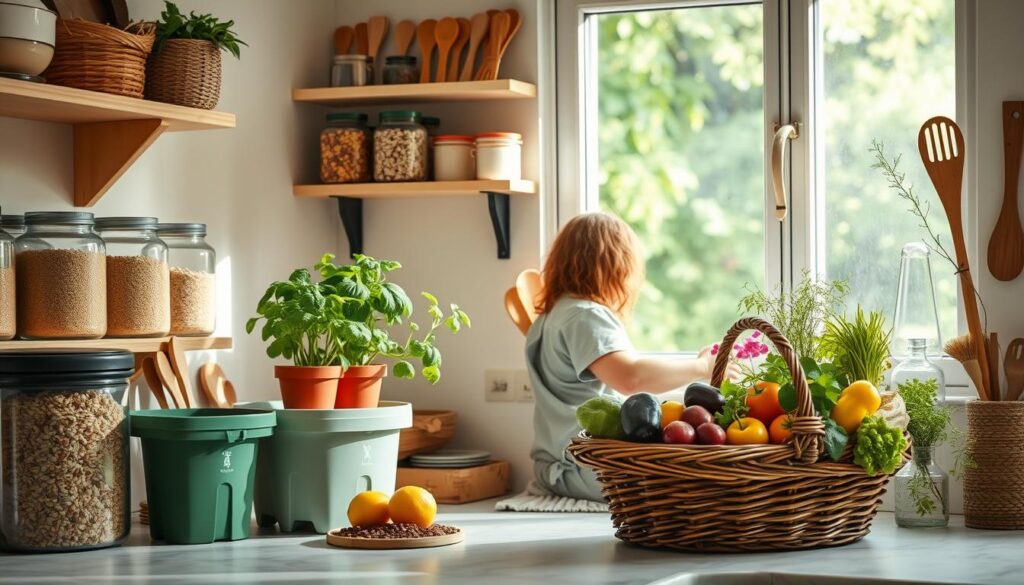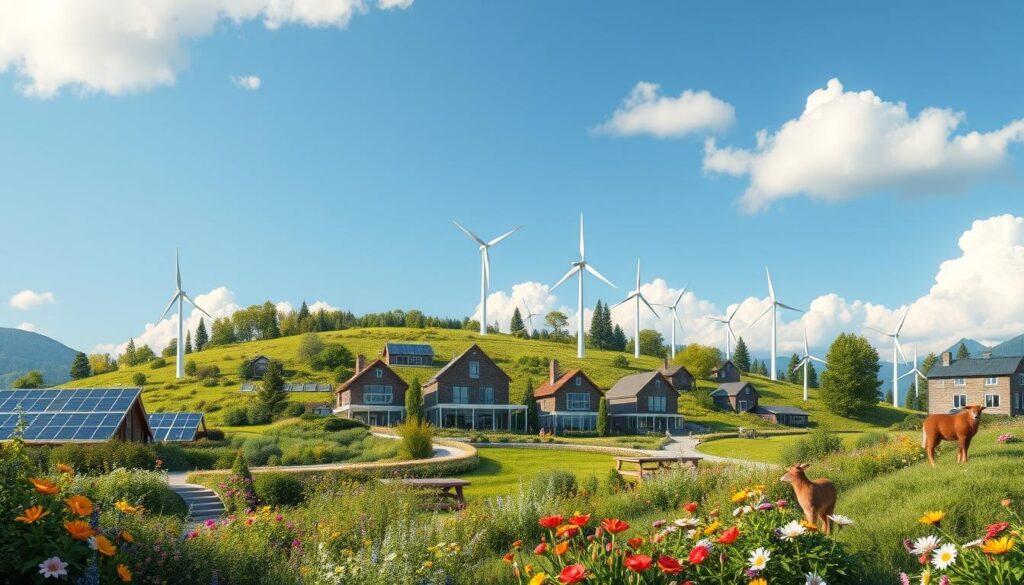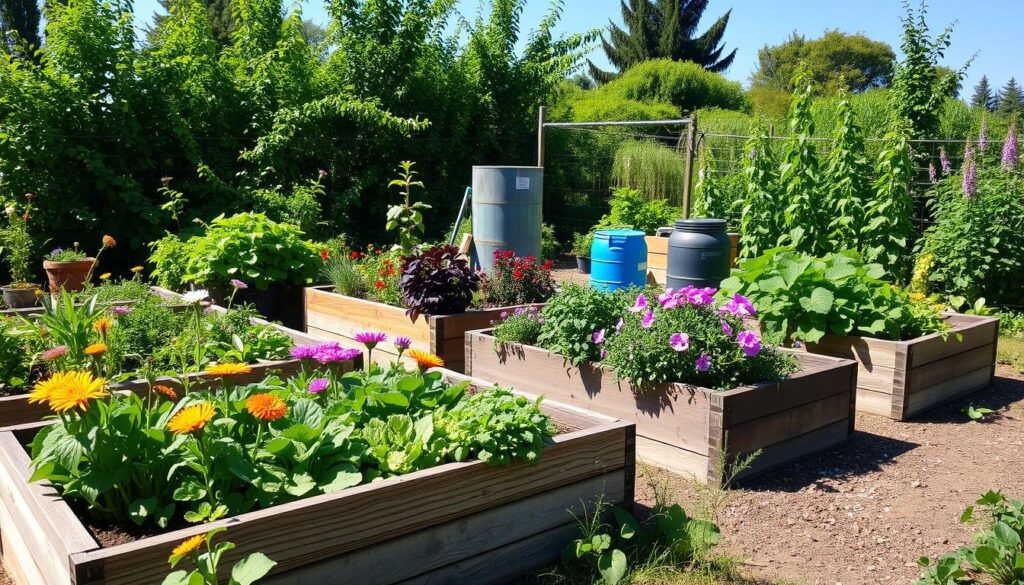חיים קיימים הם כל כך קשורים לבחירות שהן טובות לסביבה. זה אומר להיות מודעים לצריכתנו ולקבלת הרגלים חביבים על הסביבה. העולם נתקל בבעיות גדולות כמו שינויי אקלים ואובדן שוניות במינים. זה עושה את הפעולה בדרכים שתומכות בבריאות כדור הארץ שלנו עוד יותר חשוב.
ארגונים, כולל האומות המאוחדות, אומרים שהמעבר ל חיים קיימים הוא קריטי. הם מראים כיצד זה לא רק טוב לכדור הארץ אלא גם מועיל לבריאות ולאושר שלנו.
הקרן העולמית לחיות הבר משתף פעולה עובדות מדאיגות על כיצד הדרכים הנוכחיות שלנו פוגעות בטבע. אבל יש כאן חדשות מקוות: אפילו שינויים קטנים בדרך שבה אנו חיים יכולים לעשות הבדל גדול לכדור הארץ שלנו. אנשים וקהילות ברחבי העולם מקבלים את השיטות הירוקות הללו. הפעולות שלהם מוכיחות שכל פעוט עוזר ביצירת עתיד ירוק יותר.
מסקנות מרכזיות
- חיים קיימים תומכים ב- קיומיות סביבתית דרך בחירות מודעות.
- צריכה מודעת עשויה להוביל לסגנון חיים בריא ולכדור הארץ הטוב יותר.
- ארגונים גלובליים מדגישים את חשיבות החיבוק של סגנון חיים ידידותי לסביבה.
- שינויים קטנים בהרגלי יום-יום עשויים להיות לטובת הקיימות.
- אובדן המגוון הביולוגי עשוי להימעט באופן דרמטי עם שיטות קיימות.
הבנת חשיבות הקיימות
כדי להבין את הקיימות היום, חיוני להבין את טבעה המורכב. זה אומר לשמור על איזון בסביבה שלנו תוך תמיכה בצמיחה כלכלית ובצדק בחברה. האיזון הזה חיוני בעת שאנו מתמודדים עם שינויי אקלים ונזקי סביבה. הדו"ח של ברונדטלנד מזהה שלוש עמודות של קיימות: סביבתית, חברתית וכלכלית. הן מראות כמה חשוב לבחור ב-בחירות קיימות. בחירות אלו חייבות לעזור לכדור הארץ, לאנשים ולכלכלה.
הגדרת הקיימות בהקשר הנוכחי
הקיימות התרחבה כדי לכסות משמעות רחבה יותר. היא מקשרת בין פעולות האדם לבריאות הכדור הארץ. היא דורשת בחירות שטובות עבורנו עכשיו ועבור אלה שיבואו אחרינו. המבט הרחב הזה הוא מרכזי לפתרון בעיות גדולות בעולם. על ידי קבלת בחירות חכמות, אנשים יכולים להפחית את ההשפעה שלהם על הסביבה. הם יכולים גם לעזור לחברה ולשמור על יציבות הכלכלה. בקיצור, אנו צריכים לשנות את דרכי החשיבה והפעולה שלנו למען הקיימות.
השפעת הסביבה של בחירות היומיום
הבחירות שאנו עושים מדי יום חשובות מאוד לכדור הארץ שלנו. סוכנות הסביבה אומרת שהפעולות שלנו מוסיפות לבעיות גדולות כמו זיהום ושינויי אקלים. הידע על קיימות עוזר לנו לקבל בחירות טובות יותר. אנו יכולים לעשות דברים פשוטים כדי לעזור, כמו:
- שימוש פחות באנרגיה
- שימוש פחות במים
- בחירה במוצרים ידידותיים לסביבה
- מחזור יותר
על ידי עשיית בחירות קיימות יומיומיות, אנו עוזרים לכדור הארץ שלנו. אנו גם מחזקים אותו נגד אתגרי שינויי האקלים.
שיטות חיים קיימות: גישה מקיפה
שילוב של קיימות לחיינו היומיומיים הוא מרכזי לעתיד חיובי. על ידי קבלת רגלי חיים קיימות בקנה מידה מלא, אנו יכולים לשנות את הרגלי האישיות שלנו ואת הפעולות בקהילה. עשיית בחירות פשוטות כמו שימוש פחות במים, חיסכון באנרגיה וקניית מוצרים מקומיים יכולה לעשות הבדל גדול.
שילוב של קיימות בחיי היומיום
Increased community engagement by participating in local sustainability initiatives
By adopting sustainable practices, we not only contribute to a healthier planet but also create a more vibrant and resilient community for ourselves and our children.
- חיסכון כלכלי באמצעות ירידת עלויות אנרגיה ותשלומי השטחה
- חיזוק העמים המקומיים כאשר שכונות מתאחדות לפרויקטים ידידותיים לסביבה
אימוץ הרגלים קיימים מביא לפרסים ארוכי טווח, הבטיחות של קהילותינו ואחדותן.

| שיטת קיימות | יתרונות לטווח קצר | יתרונות לטווח ארוך |
|---|---|---|
| מכשירי חשמל יעילי אנרגיה | חשבונות יותר נמוכים | הפחתת פליטת גזי חממה |
| עיצוב נוף מקומי | פחות תחזוקה | שיפור ביודיברסיטה |
| השקעה מקומית במוצרים | תמיכה בכלכלה המקומית | חיזוק קשרי קהילה |
שלבים פשוטים להתחלת המסע הקיימות שלך
להתחיל מסע קיימות עשוי להראות קשה, אך ניתן לעשות זאת בכמה שלבים פשוטים. הפחתת הפסולת שלך ומיחזור נכון עושה הבדל גדול בהגנת כדור הארץ שלנו. בחירה במוצרים שטובים לכדור הארץ וקנייתם בדרך ידידותית לסביבה עוזרת גם. הנה כמה טיפים מרכזיים לעזור לך להתחיל.
הפחתת הפסולת ומיחזור ביעילות
הפחתת הפסולת היא מרכזית לעזור לסביבה שלנו. נסה את הרעיונות האלה:
- מיחזור אורגני: הפוך את שאריות המטבח שלך לדשן עשיר לגינה שלך.
- קנייה בכמות גדולה: קנייה בכמות גדולה עוזרת להפחתת הפסולת של אריזות.
- מינימליזם: לחיות עם פחות דברים יכול להפחית את הפסולת ואת העומס.
גם חשוב למחוזר נכון. ידע מה ניתן ומה לא ניתן למחוזר כדי לעשות טוב יותר. דבר עם מרכז המיחזור המקומי שלך לקביעת כללים. השתמש בקופסאות שונות לפסולת הממוחזרת שלך כדי לשמור עליהן ממוינות.
בחירת מוצרים ידידותיים לסביבה
מוצרים ידידותיים לסביבה עושים הבדל גדול בקיימות. בעת קניות, חפשו מותגים שדואגים לסביבה. קבוצת העבודה לסביבה (EWG) מעניקה דירוגי בטיחות למוצרים. שימו לב לתוויות קיימות. הנה כמה מותגים ידידותיים לסביבה:
| מותג | סוג מוצר | מוצרים |
|---|---|---|
| הדור השביעי | מנקה לבית | מוצרים ביודגרדבילים ולא רעילים |
| ברט'ס ביז | טיפוח אישי | רכיבים טבעיים ושיטות קיימות |
| מתוד | ציוד ניקוי | פורמולות מבוססות צמחים עם אריזה ממוחזרת |
על ידי עקיבות אחר ההנחיות הללו, תוכל ליצור שינוי אמיתי. תעזור להפחית פסולת, לממש ריבייקלינג בצורה יותר טובה, ולבחור מוצרים ידידותיים לסביבה. בואו נעבוד יחד לעתיד ירוק יותר.
תפקיד האנרגיה מתחדשת בחיים בר-תוקף
הוספת אנרגיה מתחדשת לחיינו מעלה את מאמצי האנרגיה הבר-תוקפת. חשוב לדעת את המקורות המתחדשים השונים הזמינים. הידע הזה עוזר לאנשים לבחור בחוכמה כדי להפחית את השפעתם הסביבתית ולתמוך בקיימות האנרגיה.
סוגי מקורות אנרגיה מתחדשת
קיימים רבים סוגי אנרגיה מתחדשת לצרכים ולמקומות שונים. בהם:
- אנרגית שמש: זו נלכדת דרך פאנלים סולאריים והיא הטובה ביותר באזורים שמוצאים בהם השמש בשפע.
- אנרגית רוח: נוצרת על ידי טורבינות רוח, ועובדת בצורה טובה באזורים שמקבלים הרבה רוח.
- אנרגית הידרואלקטרית: מגיעה ממים זורמים ונמצאת בשימוש תדיר ליד נהרות או סכרים.
- אנרגית גאותרמלית: נתפס מחום האדמה, זה אידיאלי ליד פעילות געשית.
היתרונות של שימוש באנרגיה מתחדשת בבית
ישנם הרבה יתרונות לשימוש באנרגיה מתחדשת בבית. היתרונות הללו מהווים טיעון חזק לשקול פתרונות אנרגיה ביתית מתחדשת.
| תועלת | תיאור |
|---|---|
| חיסכון בעלויות | ניתן להוריד את חשבונות השירותים על ידי שימוש פחות באנרגיה מסורתית. |
| עצמאות אנרגטית | שימוש פחות בדלקים גורם לגידול בטחון האנרגיה. |
| השפעה סביבתית | שיחרור פחות גזי חממה עוזר לשמור על בריאות כדור הארץ שלנו. |

יצירת גינה בר-תוקף
גינון בר-תוקף הוא טוב לכדור הארץ ולרווחתנו. זה משתמש בשיטות אורגניות, חופשיות מחומרי רעילות, שמפגינות את האדמה והצמחים בבריאות יותר. סוג זה של גינון מזמין חרקים ומיקרובים מועילים, ומפגין את הגינה שלך לקרות חיים. מחקרים, כמו אלה מאינסטיטוט רודייל, מראים שגינות כאלה גודלות מזון בריא יותר ועוזרות לסביבה.
יתרונות של גינון אורגני
גינון אורגני משפר את המגוון של החיים ואת בריאות האדמה. על ידי שימוש בדשנים טבעיים, האדמה מתעשית, עוזרת לצמחים לגדול טוב יותר. הנה כמה יתרונות:
- מזון בריא יותר: מזונות אורגניים הם יותר מזינים.
- בטיחות סביבתית: זה מפחית את זיהום המים מחומרים כימיים.
- שיפור הביודיברסיטה: סוגי צמחים רבים יותר מביאים לחיים מגוונים יותר.
- שיפור האדמה: חומרים טבעיים גורמים לאדמה לשמור על מים יותר טוב.
טכניקות לשמירה על מים בגינות
שמירה על מים היא מרכזית לגינה ירוקה. שימוש בשיטות חכמות יכול לחתוך בשימוש במים מבלי לפגוע בגינה שלך. כמה מהאסטרטגיות המובילות כוללות:
- צמחיית נקיש: גישה זו משתמשת בצמחים שלא זקוקים בהמון מים.
- איסוף מי גשם: לתפוס את הגשם כדי להשתמש בו מאוחר יותר הוא יעיל.
- שקיפת טיפה: מערכות טיפה מעבירות מים ישירות לשורשים.
- כיסוי בקרקע: שכבות אורגניות שומרות על האדמה לחה ונקייה מזילות.

הוספת הטיפים לשמירה על מים אלה לגינה שלך עוזרת לכדור הארץ.
גינון קיימאי מודע לסביבה ומחבר אותנו עם הטבע. זה צעד חיובי לעבר אקוסיסטם בריא יותר.
התעסקות עם הקהילה שלך לצורך קיימות
השתתפות בקהילה היא מרכזית לקיימות. על ידי הצטרפות למאמצי קיימות מקומיים, אנשים עושים הבדל אמיתי. השתתפות זו בונה תחושת צוות והישג. הנה כמה אזורים עיקריים לחקור.
השתתפות במערכות יציבות מקומיות
להיות חלק ממאמצי קיימות מקומיים יכול להעמיק את הידע שלך בקיימות ולגרום לשיפור חיובי. תוכל להתנדב בגני קהילה או לעזור בניקיונות שכונתיים. שקול את הפעילויות הבאות:
- הצטרפות לקבוצות סביבתיות מקומיות.
- השתתפות בימי נטיעת עצים בקהילה.
- הרשמה לסדנאות על שיטות קיימות.
- השתתפות בשווקי חקלאים שמעדיפים ירקות אורגניים ומקומיים.
בניית רשת תמיכה לחיים קיימים
יצירת רשתות תמיכה לקיימות עוזרת לחזק את ההתחייבות שלך לסביבה. פגישה עם אנשים אחרים שדואגים לחיים ירוקים יוצרת מרחב לשיתוף רעיונות וצמיחה. לדוגמה:
- הצטרפות לקבוצות במדיה חברתית המתמקדות בנושאי קיימות.
- הקמת מעגלי לימוד מקומיים המוקדשים לשיטות חיים ירוקות.
- התעסקות עם ארגונים כמו ערים במעבר, המדגישים עמידה קהילתית.
השתתפות מקומית יוצרת תחושת קהילה חזקה. זה עוזר לאנשים לעבוד יחד על אתגרים סביבתיים. זה בונה קשרים ורשתות תמיכה לעתיד קיימות.
מסקנה
כשאנו מסיימים את המסע שלנו לחיים קיימים, אנו רואים כיצד הבחירות היומיומיות שלנו משפיעות באופן משמעותי על בריאות הכדור הארץ. הטיפים ששותפו במאמר זה מראים לנו דרכים לחיות טוב יותר ולעזור לסביבה. בחירה לחיות בצורה קיימת חשובה עבורנו ולדורות העתיד.
אנו מוזמנים לקבל החלטות מודעות לחיות בצורה יותר קיימת. פעולות קטנות כמו צמצום פסולת, שימוש באנרגיה מתחדשת, או הצטרפות למאמצי הקהילה חשובות. כל צעד שאנו עושים יכול להוביל לשינויים גדולים עבור הסביבה.
לכל מי שמעוניין ללמוד עוד על קיימות, ישנם מקורות רבים זמינים. כדאי לבדוק את אתרי הסביבה ולקחת קורסים מקוונים כדי להרחיב את הידע שלך. זה יעזור לך לעשות שינוי בחיי היומיום שלך. על ידי עבודה משותפת, אנו יכולים לוודא כי יהיה לכדור הארץ עתיד בריא.